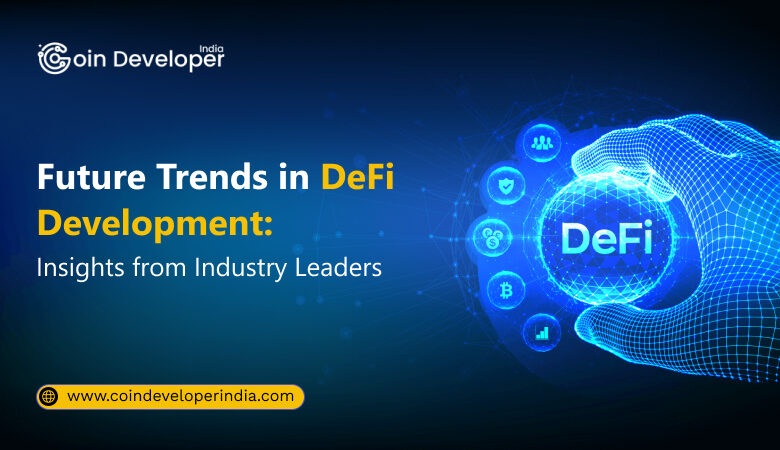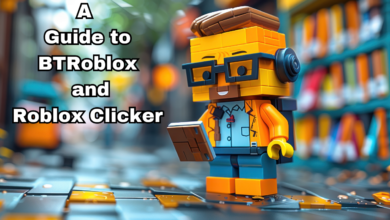Future Trends in DeFi Development: Insights from Industry Leaders

With the global DeFi market valued at USD 22 billion in 2022, projected to hit USD 48.02 billion by 2031, the Decentralized Finance industry is growing rapidly. DeFi’s growth has been a game-changer for businesses, offering alternatives to traditional financial systems by removing intermediaries and bringing transparency to transactions.
In this blog, we’ll explore some of the key trends shaping the future of DeFi development, with insights from industry leaders that provide a glimpse into where this space is heading.
Sounds insightful, right? Let’s get started!
Key Emerging Trends in DeFi Development
Here’s a list of top 5 emerging trends in the DeFi development industry that you shouldn’t miss on –
NFT Integration
One of the most exciting trends in DeFi development is the integration of non-fungible tokens (NFTs) into decentralized platforms. NFTs have already transformed industries like art, real estate, and gaming by enabling unique digital assets to be bought, sold, and owned. When integrated into DeFi platforms, NFTs can be used as collateral for lending and borrowing, adding a new dimension to the financial ecosystem.
Imagine tokenizing a valuable piece of digital art and using it as security for a loan or a mortgage on a virtual property. This trend is making DeFi development more inclusive and expanding the types of assets that can circulate in the digital economy.
Benefits of NFT Integration:
-
New Revenue Streams: Businesses can create and sell unique digital assets, opening doors to new forms of income.
-
Customer Engagement: Offering NFT-based experiences or rewards enhances customer loyalty and interaction.
Sustainable Finance Initiatives
With sustainability becoming a major focus across industries, sustainable finance initiatives are gaining momentum in DeFi. By incorporating environmental, social, and governance (ESG) principles, DeFi platforms are creating green investment opportunities and developing carbon offset mechanisms. These initiatives aim to reduce the environmental impact of blockchain technology, which has been a concern due to its high energy consumption.
Adopting eco-friendly practices not only helps save the planet but also attracts a growing segment of investors who prioritize sustainability. This push for sustainable finance within DeFi is likely to shape the future of the industry, making it more ethical and responsible.
Competitive Advantages of Prioritizing Sustainability in DeFi
-
Enhanced Credibility: By adopting sustainable DeFi strategies, companies can significantly boost their reputation and credibility. This positions them as responsible and forward-thinking, which can be a magnet for environmentally-conscious investors and users who value ethical practices.
-
Long-term Viability: DeFi platforms that integrate sustainable practices can reduce their environmental footprint and stay ahead of potential regulatory changes related to environmental policies. This proactive approach mitigates long-term risks and enhances business growth by ensuring they operate within future environmental regulations.
Layer 2 Scaling Solutions
One of the biggest challenges DeFi faces is scalability, especially on networks like Ethereum, where high transaction fees and slow processing times are major roadblocks. Enter Layer 2 scaling solutions, which provide an answer to these problems by moving transactions off the main blockchain. Technologies like rollups and sidechains allow for faster and cheaper transactions while maintaining the security of the primary chain.
For businesses, Layer 2 solutions offer a practical way to enhance user experience, reduce costs, and boost efficiency, making DeFi development applications more accessible to a broader audience.
How Layer 2 Scaling Solutions Help Businesses:
-
Reduced Costs: Lower transaction fees directly improve profitability by cutting operational expenses.
-
Enhanced Performance: Faster transaction processing means smoother user experiences and more efficient operations.
DeFi Insurance Protocols
As DeFi development grows, so do the risks involved, from smart contract failures to yield farming vulnerabilities. DeFi insurance protocols are designed to mitigate these risks by offering decentralized insurance coverage. Whether it’s protecting against hacking or a faulty smart contract, these protocols ensure that DeFi platforms are more secure and reliable.
The demand for insurance in DeFi is expected to grow as the market expands, offering a safety net for businesses and users alike. These decentralized insurance solutions provide better risk management at lower costs compared to traditional insurance services.
DeRisking Decentralized Finance – Advantages of DeFi Insurance:
-
Risk Mitigation: Businesses can protect against a wide range of risks through decentralized insurance solutions.
-
Cost Efficiency: Lower premiums and faster claims processing than conventional insurance.
DeFi Gaming and Virtual Economies
Another fascinating trend is the convergence of DeFi and gaming. DeFi gaming platforms allow players to earn real value through in-game assets and currencies that are tradable in decentralized marketplaces. This creates new opportunities for virtual economies, where players can monetize their skills and virtual possessions.
For businesses, DeFi gaming offers a chance to tap into the lucrative gaming market, engaging users in innovative ways while blending financial incentives with entertainment.
Advantages of DeFi Gaming and Virtual Economies:
-
Monetization Opportunities: Businesses can create and sell virtual goods, tapping into a booming industry.
-
Innovative Marketing: Engaging customers in virtual environments fosters deeper connections and loyalty.
Insights from Industry Leaders for DeFi development
Industry leaders are offering valuable perspectives on how DeFi will evolve. Yuji Kawada, Senior Researcher at Mitsubishi Research Institute, notes,
“Embedded Supervision can be a promising approach to integrate compliance into DeFi protocols, ensuring transparency while reducing the compliance burden on businesses.”
Hideaki Kudo, Executive Director at Nomura Holdings, adds,
“DeFi can offer a high degree of financial inclusion by removing unnecessary intermediaries and creating new financial products and services that meet the specific needs of underbanked populations.”
These insights reflect how DeFi is not just about technology but also about providing new financial solutions that address global challenges.
Conclusion
The future of DeFi development is bright, with trends like NFT integration, sustainable finance, Layer 2 scaling, insurance protocols, and DeFi gaming leading the charge. These innovations are transforming industries and opening new opportunities for businesses and users alike.
If you’re looking to explore the potential of DeFi development for your business, now is the time to act. Coin Developer India, a leading DeFi development company, can help you navigate this space and implement cutting-edge solutions that set you up for success in the decentralized world.
Reach out today and take the first step into the future of finance!




